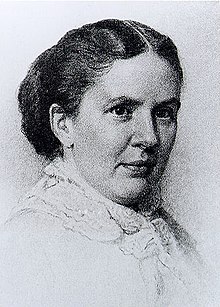Alice Fletcher
Alice Cunningham Fletcher (born March 15, 1838 in Havana , † April 6, 1923 in Washington, DC ) was an American ethnologist who studied the culture of the North American Indians .
Life
Alice Fletcher's father was a New York lawyer who moved to Cuba because of the mild climate to protect his health. Her mother came from a respected Boston family. After her father's death in 1839, the family moved to Brooklyn Heights, where she attended the Brooklyn Female Academy and became a teacher. Encouraged by Frederic Ward Putnam , director of the Peabody Museum of Archeology and Ethnology at Harvard, who became her patron, she began to be interested in North American Indian culture and archeology, especially in the Mississippi and Ohio river basins, and became a member in 1879 of the Archaeological Institute of America. She later assisted Putnam in acquiring the Serpent Mound archaeological site as a protected area. In 1881 she taught at the Carlisle Indian School in Pennsylvania, an elementary school for Indian children, and from 1881 lived with the Sioux ( Omaha tribe ) as an envoy from the Peabody Museum to research their culture. She was supported by the Indian translator Susette "Bright Eyes" La Flesche, who also translated during the Standing Bear process . She adopted her half-brother Francis La Flesche , with whom she worked closely and who lived in her home in Washington, DC from 1890.
In 1883 she was the US government agent for land allocation to the Miwoks and in 1884 she organized an Indian exhibition at the World Cotton Centennial in New Orleans. In 1886 she officially visited the indigenous people of Alaska and the Aleutian Islands and in 1887 she was federal agent for land allocation of the Winnebago and Nez Percé (in whose reservation in Idaho she encountered resistance from Chief Joseph , which, however, did not deter her). She also took care of social issues for the Indians, arranged small loans and enabled the Indian Susan LaFlesche to study medicine (she was the first Indian woman to become a doctor in the USA). She also campaigned for the Dawes Act (1887), which was supposed to allow Indians to own private land on their reservations, which, however, had a negative impact on the Indians as the reservations were broken up (land claims fell from 150 million acres under the Dawes Act to 77 around 1900 up to 48 million when it was canceled in 1934).
In 1882 she became an assistant in ethnology at the Peabody Museum, and in 1891, thanks to a wealthy donor, she received job funding specially set up for her ( Margaret Copley Thaw scholarship). In 1905 she was President of the American Folklore Society and in 1903 she was President of the Anthropological Society of Washington. In 1923 she was vice president of the American Association for the Advancement of Science .
One of her areas of research was Indian songs and music. Together with her adopted son, she is considered to be a pioneer of ethnological research into the Omaha tribe, but she also dealt with the Pawnee, Sioux, Chippewa, Nez Percé, Ponca, Winnebago and Cheyenne. In 1908 she founded the School of American Archeology in Santa Fe. She served on the editorial board of The American Anthropologist from 1899 to 1916 .
Fonts (selection)
- Indian Story and Indian Song from North America . Boston 1900, Project Gutenberg
- with Francis La Flesche: The Omaha Tribe . 1911, archive.org
- Indian Games and Dances with Native Songs Arranged from American Indian Ceremonials and Sports . Boston, 1915
- The Hako: A Pawnee Ceremony . 1904, archive.org
literature
- Joan Mark: A Stranger in Her Native Land: Alice Fletcher and the American Indians . University of Nebraska Press, Lincoln 1988
- Marilyn Bailey Ogilvie : Women in science: antiquity through the nineteenth century: a biographical dictionary with annotated bibliography . 3. Edition. MIT Press, Cambridge MA 1991, ISBN 0-262-65038-X , pp. 86-87
- Fletcher, Alice Cunningham . In: Encyclopædia Britannica . 11th edition. tape 10 : Evangelical Church - Francis Joseph I . London 1910, p. 496 (English, full text [ Wikisource ]).
| personal data | |
|---|---|
| SURNAME | Fletcher, Alice |
| ALTERNATIVE NAMES | Fletcher, Alice Cunningham (full name) |
| BRIEF DESCRIPTION | American ethnologist |
| DATE OF BIRTH | March 15, 1838 |
| PLACE OF BIRTH | Havana |
| DATE OF DEATH | April 6, 1923 |
| Place of death | Washington, DC |
